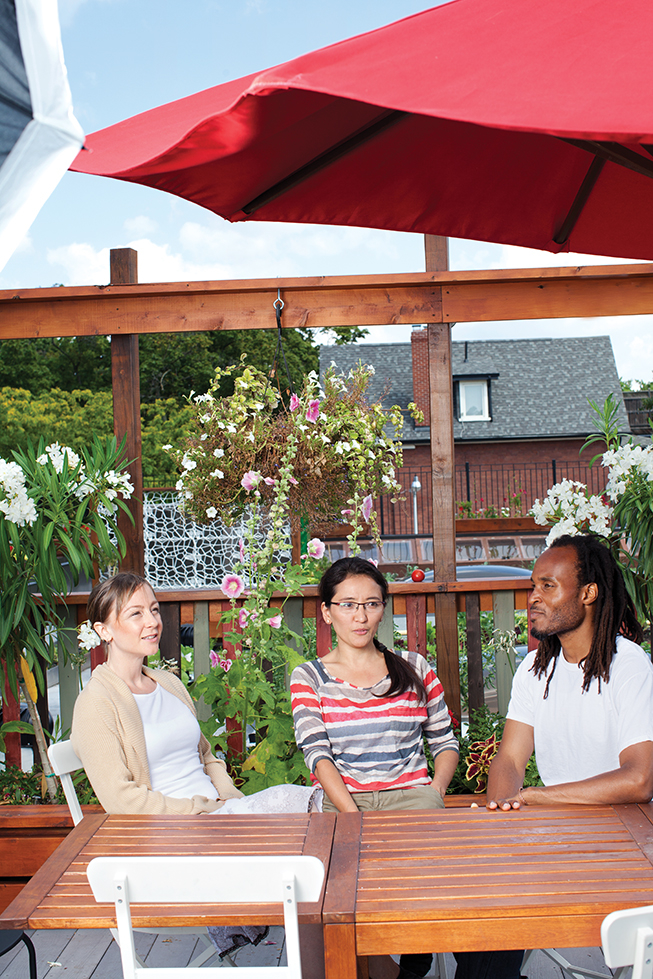Deep Roots
Founded as a co-op in the ‘80s, the Big Carrot is a thriving business that meets the needs of the community
By Joe Tuck
Photography by Babar Khan
Organic and and natural food philosophies were relegated to the counterculture and barely conceived of, much less a business model, in 1983, when nine like-minded people got together and founded The Big Carrot as a worker-owned natural food market. They were inspired by a book by Karen Brandow called No Bosses Here: A manual on working collectively and cooperatively and The Mondragon Experiment, a BBC documentary about local efforts in the Basque region of Spain to improve quality of life by employing co-operative workplace models.
Patrick Conner, HR & PR Coordinator of The Big Carrot, declares the original mandate was, and still is, “to provide a one-stop organic shop, to sell sustainable products, to offer an alternative to products of industrial agriculture and to provide meaningful work for its members and employees.”
From the original nine, The Big Carrot, located at Danforth and Jackman on Toronto’s colourful Danforth strip, now has 70 “worker owners” and an additional 110 part-time employees—people who work for The Big Carrot and are not currently owners.
Adaptable philosophy
Having seen its membership and staff grow 20-fold over the past 28 years, The Big Carrot has had to adapt its business philosophy with this expansion.
“Originally, all members were involved in the decision-making, but as the business grew, this became difficult, time consuming and impractical,” Conner explains. “A number of changes have occurred over the years. Membership does have the final say on the vision, standards and large expenditures of the business.
“However, in order to assist membership with these decisions, there is a board of directors that actively work in the store, as opposed to an advisory type board of directors. In order to maintain membership, or ownership, a member must commit to working at least 33 hours a week at the store.”
When describing the organizational chart and company hierarchy, Conner admits, “It’s clear as mud. That said, it does work.”
The Big Carrot is a community of workers and a business that serves as inspiration to neighbouring enterprises, aspiring entrepreneurs and holistic-type start-ups.
“People are elected to the board from the membership, who meet weekly with the operations manager and his assistants,” Conner says. “During membership meetings, which happen every two weeks, we operate as a democracy. Each member has one vote pertaining to each item of business. Upon adjournment of the meetings, to ensure smooth running of a thriving business, we operate in a more typical, pyramid-shaped hierarchy. At the top of this hierarchy is the operations manager; below him are the floor managers, then the department managers, their assistants, shift supervisors and then workers. This may mean that a member can be a manager or a supervisor or even a worker and still have an equal say in the ‘big picture’ issues facing the company. However, when we are ‘on the floor,’ we report to our immediate superiors.”
No GMO
The Big Carrot is best known for its rigorous standards, particularly its stance on genetically modified organisms (GMO) in food products. This commitment is evidenced by the in-store programs and the company’s involvement as members and supporters of a plethora of organizations and initiatives.
In addition to being a member of the Canadian Organic Trade Association (COTA), the Organic Council of Ontario (OCO) and the Canadian Health Food Association (CHFA), The Big Carrot is a founding member of The Non-GMO Project, a non-profit voluntary-based labelling initiative that provides North America’s only third-party verification service for companies demonstrating due diligence in avoiding GMOs in the production of food.
Everything certified
With the introduction of the Canadian Organic Standard in 2009, The Big Carrot became one of the first retailers in Canada to be certified. This standard applies to process, meaning its food processing facilities, including the kitchen/bakery, juice bar, bulk and produce departments, are all certified.
“Our produce department, for instance, carries only certified organic produce, the only exception being some ‘wild’ produce throughout the year… mushrooms, fiddleheads, etc.,” says Conner. “This assures customers that they will never be faced with conventional and organic items side by side. This would lead to customer confusion.”
Upon entering The Big Carrot, a new customer might feel as if they are entering a store that’s part community centre. There are constant meet-ups, tours, group chats and “happenings.” Bulletin boards are covered with postings in support of various neighbourhood initiatives. Newsworthy, info-based and thought-provoking pamphlets are also on display around the store.
To help new customers, Conner says, “The Big Carrot provides free nutritional store tours for our customers where they can have an hour with a qualified nutritionist who can listen to their concerns or problems and then take them through the store and point out food items that can help them improve their health. Many of our first-time customers arrive having recently had a health scare, and when they arrive, yes, they are overwhelmed. These tours can help demystify the experience and make them feel welcome and appreciated.”
Free seminars
The Big Carrot also hosts free Thursday night seminars throughout the year (excluding the summer months) in the seminar room on the second floor. A variety of wellness topics are discussed to help customers and visitors make healthier, informed choices.
Beyond the store, furthering its educational outreach, The Big Carrot offers sessions to schools and groups. It also sponsors the Guelph Organic Conference every January, and the Canadian Organic Growers Toronto Conference every February.
“Right now, our biggest challenge is accommodating our programs and popularity with a lack of space,” says Conner. Initiatives such as Carrot Green Roof might help them overcome this obstacle and be the way of the future. “We are very proud of the Carrot Green Roof, which is becoming a learning hub that demonstrates urban agriculture and green roof gardening to the greater community. Gardens of different sizes with different soils and plants grow up there.”
With so many initiatives in place, it’s easy to see how The Big Carrot became a Toronto institution and how it was able to build on a customer base through simple word-of-mouth and previous accreditations.
“Our greatest strength is in the diversity of our staff. We are small but mighty. We stick to our convictions that a healthy and sustainable world is possible through education, outreach and example,” says Conner.
Carrot Cache
A joint venture agreement was created among the owners of the property, which declared that if the mall ever made a profit, a portion of it would go to Carrot Cache. This was created to provide seed money to start up worker co-ops, organic agriculture enterprises and social justice enterprises.
Over the last eight years, Carrot Cache has granted more than $1 million to more than 165 organizations and individuals. It has a board of directors headed by Mary Lou Morgan, a founding member of the Big Carrot. As well, over the years, The Big Carrot’s internal donations account has donated funds to farmers’ organizations, tsunami relief, local shelters and community groups.
What is Carrot Common?
Carrot Common is the real estate, or the small shopping centre, that houses The Big Carrot, which is the anchor tenant, and owns one third of the mall. The Playter family, who owned what used to be a car dealership on the corner of Danforth and Jackman, loved the business philosophy of The Big Carrot and wanted to sell the property to the original nine partners.
The greater Carrot Common was the brainchild of David Walsh, a local real estate developer and philanthropist. At the time, it was beyond the modest means of the collective to purchase the property, so Walsh encouraged The Big Carrot to solicit funds from customers as Class A shareholders. With that money, and investments from the group members themselves, The Big Carrot was offered one third of the mortgage of the mall.
After that, The Big Carrot became the principal tenant of Carrot Common, and the other suites have since been rented out to like-minded businesses such as Book City, Gifts of the Earth, Inspired Life, as well as numerous practitioners, therapists, counsellors and studios on the second floor.
As the popularity of The Big Carrot grew, the store expanded into other suites in Carrot Common. Over the years, the Wholistic Dispensary (the supplements department) took over a suite across the courtyard, and the Organic Juice Bar was opened when another fellow tenant, the Fresh Pot, closed.









